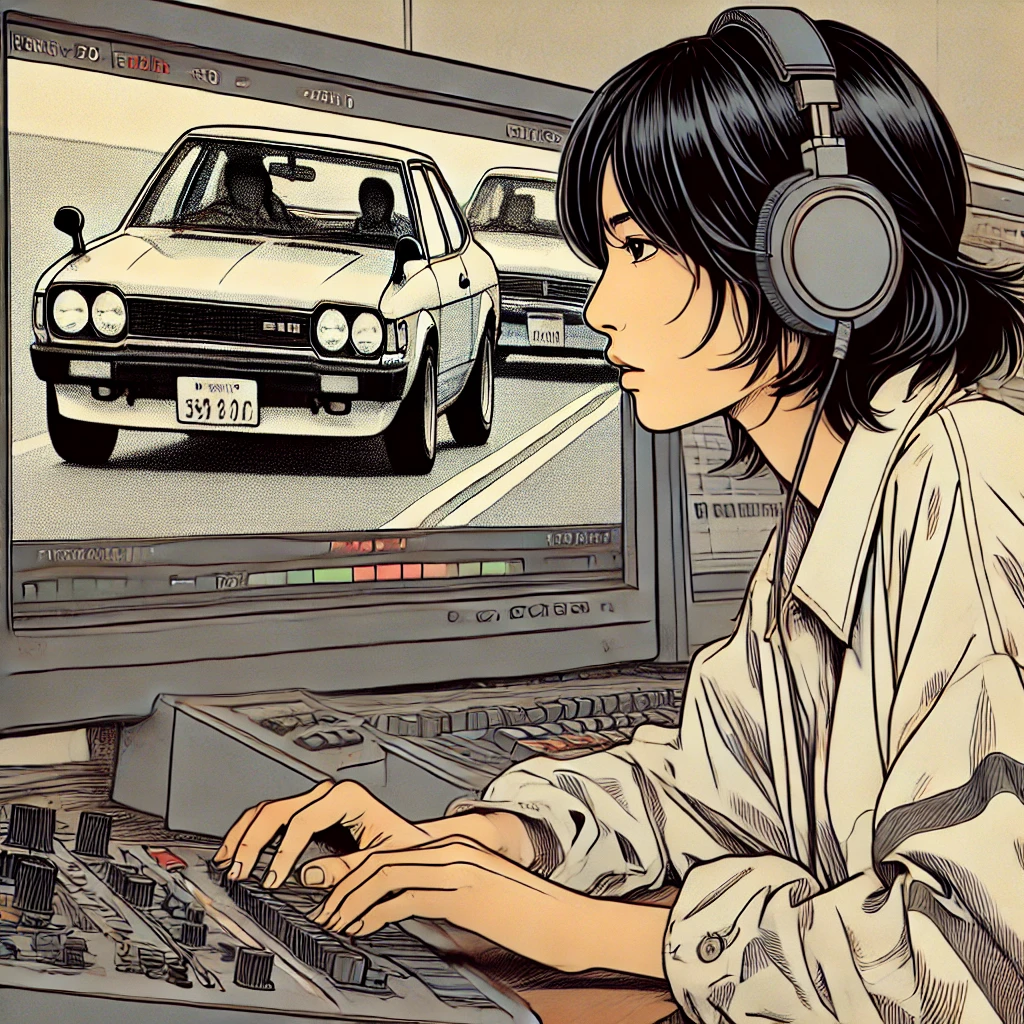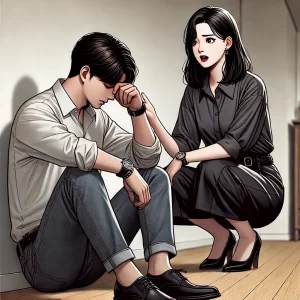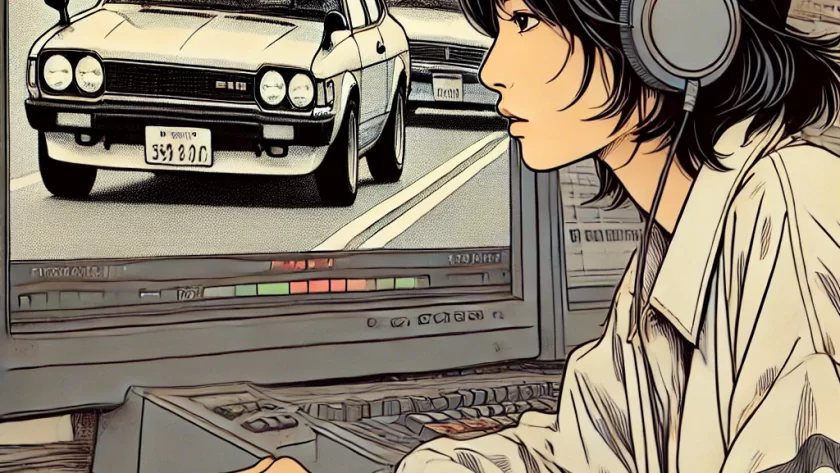プレイバックPart2 [Pureibakku Pāto Tsū]
山口百恵 [YAMAGUCHI Momoe]
Words : 阿木燿子 [AGI Yōko]
Music : 宇崎竜童 [UZAKI Ryūdō]
Momoe Yamaguchi is an iconic idol and actress of the 1970s. She gained immediate attention in 1972 by appearing on the television audition program “Sutā Tanjō!” (=A Star Is Born!), marking an overwhelming start to her career. She has many hit songs, but completely retired in 1980 upon getting married. While her husband and son are active as actors and musicians, Yamaguchi has not appeared on TV since her retirement, making her a legendary idol.
“Playback Part 2” is Yamaguchi’s 22nd single, released in 1978. The lyricist, Yōko Agi, and the composer, Ryūdō Uzaki, are a married couple who have created many famous songs together.
緑の中を走り抜けてく真紅なポルシェ
midori no naka o hashirinukete ku makka na porushe
- 緑(みどり) [midori] : green
- 中(なか) [naka] : inside
- 走り抜ける(はしりぬける) [hashirinukeru] : run through
- 真っ赤(まっか) [makka] : bright red
- ポルシェ(ぽるしぇ) [porushe] : Porsche
(translation) “A bright red Porsche running through the green plants.”
“緑 / midori” is not only a color name but originally refers to green plants and nature. There are various opinions about the model of this Porsche.

一人旅なの
hitoritabi na no
私気ままにハンドル切るの
watashi kimama ni handoru kiru no
- 一人旅(ひとりたび) [hitoritabi] : solo trip
- 私(わたし) [watashi] : I
- 気ままに(きままに) [kimama ni] : carefree
- ハンドルを切る(はんどるをきる) [handoru o kiru] : steer
(translation) “It’s a solo trip.
I steer the wheel carefree.”
“私 / watashi” is a female first-person pronoun in this context, indicating the protagonist is a woman.
交差点では隣りの車が
kōsaten de wa tonari no kuruma ga
ミラーこすったと
mirā kosutta to
怒鳴っているから
donatte iru kara
私(あたし)もついつい大声になる
atashi mo tsuitsui ōgoe ni naru
- 交差点(こうさてん) [kōsaten] : intersection
- 隣(となり) [tonari] : next to
- 車(くるま) [kuruma] : car
- ミラー(みらー) [mirā] : mirror
- こする(こする) [kosuru] : rub
- 怒鳴る(どなる) [donaru] : shout
- ついつい [tsuitsui] : unintentionally
- 大声(おおごえ) [ōgoe] : loud voice
- なる(なる) [naru] : become
(translation) “At the intersection, the car next to me
shouted that I scratched their mirror,
so I unintentionally raised my voice too.”
Oh, is it an accident? Might it lead to a quarrel?
“あたし / atashi” is a more casual first-person pronoun than “わたし / watashi.” The switch from “わたし / watashi” to “あたし / atashi” may indicate her irritation.

馬鹿にしないでよ そっちのせいよ
baka ni shinai de yo sotchi no sei yo
- 馬鹿にする(ばかにする) [baka ni suru] : make fun of
- そっち [sotchi] : you
- せい [sei] : cause, fault
(translation) “Don’t make fun of me, it’s your fault.”
Wow, that’s bold. It’s a very strong tone but still somewhat polite for a woman. For a rougher expression, it would be “馬鹿にするなよ、お前のせいだ / baka ni suru na yo, omae no sei da.”
This may not be the best lesson, but let’s learn some Japanese insults, as beginners tend to like these terms.
- 馬鹿(ばか) [baka] : fool
- あほ [aho] : idiot
These are the top two Japanese insults. Just saying these words to someone is enough to insult them. Remember them, and try not to use them.
ちょっと待って
chotto matte
Play Back Play Back
Play Back Play Back
今の言葉
ima no kotoba
Play Back Play Back
Play Back Play Back
- ちょっと [chotto] : a little, slightly
- 待つ(まつ) [matsu] : wait
- 今(いま) [ima] : now
- 言葉(ことば) [kotoba] : words
(translation) “Wait a minute
Playback
The words just now
Playback”
Do you need a dashcam? (By the way, the first car dashcam was introduced in 1998.) The words were too important to ignore.
“ちょっと待って / chotto matte” is a phrase you might say at least once a day.

馬鹿にしないでよ そっちのせいよ
baka ni shinai de yo sotchi no sei yo
There was a moment of silence here. It seems she pressed the playback button.
これは昨夜(ゆうべ)の私のセリフ
kore wa yūbe no watashi no serifu
気分次第で抱くだけ抱いて
kibun shidai de daku dake daite
女はいつも待ってるなんて
onna wa itsumo matteru nante
- 昨夜(ゆうべ) [yūbe] : last night
- セリフ [serifu] : line
- 気分(きぶん) [kibun] : mood
- 次第(しだい) [shidai] : depending on
- 抱く(だく) [daku] : embrace
- 女(おんな) [onna] : woman
- いつも [itsumo] : always
- 待つ(まつ) [matsu] : wait
(translation) “This was my line last night.
Embracing only when you feel like it,
Saying women are always waiting.”
“抱く(だく) / daku” here means spending a night together in a romantic sense, a word often used in lyrics.
坊や、いったい何を教わって来たの
bōya ittai nani o osowatte kita no
私だって、私だって、疲れるわ
watashi datte watashi datte tsukareru wa
- 坊や(ぼうや) [bōya] : boy
- いったい [ittai] : what on earth
- 何(なに) [nani] : what
- 教わる(おそわる) [osowaru] : learn
- 疲れる(つかれる) [tsukareru] : tired
(translation) “Boy, what on earth were you taught?
Even I, even I, get tired.”
Her words are very high-handed, but they also show feminine kindness and vulnerability.

はるかな波がキラキラ光る海岸通り
haruka na nami ga kirakira hikaru kaigan dōri
みじかい旅よ
mijikai tabi yo
力一杯アクセル踏むの
chikara ippai akuseru fumu no
- はるかな [haruka na] : faraway
- 波(なみ) [nami] : wave
- キラキラ [kirakira] : glittering
- 光る(ひかる) [hikaru] : shine
- 海岸(かいがん) [kaigan] : coast
- 通り(どおり) [dōri] : street
- 短い(みじかい) [mijikai] : short
- 力一杯(ちからいっぱい) [chikara ippai] : with all my might
- アクセルを踏む(あくせるをふむ) [akuseru o fumu] : step on the gas
(translation) “The faraway waves glitter on the coastal road.
A short trip.
I step on the gas with all my might.”
潮風の中ラジオのボリューム
shiokaze no naka rajio no boryūmu
フルに上げれば
furu ni agereba
心かすめて
kokoro kasumete
ステキな唄が流れてくるわ
suteki na uta ga nagarete kuru wa
- 潮風(しおかぜ) [shiokaze] : sea breeze
- ラジオ(らじお) [rajio] : radio
- ボリューム(ぼりゅーむ) [boryūmu] : volume
- フル [furu] : full
- 上げる(あげる) [ageru] : raise
- かすめる [kasumeru] : brush
- 素敵な(すてきな) [suteki na] : wonderful
- 歌・唄(うた) [uta] : song
- 流れる(ながれる) [nagareru] : flow
(translation) “In the sea breeze, if I turn up the radio volume to full,
it brushes my heart,
and a wonderful song flows.”
What kind of song is playing?

勝手にしやがれ 出ていくんだろ
katte ni shiyagare deteikun daro
ちょっと待って
chotto matte
Play Back Play Back
Play Back Play Back
今の歌を
ima no uta o
Play Back Play Back
Play Back Play Back
- 勝手に(かってに) [katte ni] : as you please
- する(する) [suru] : do
- 出ていく(でていく) [deteiku] : leave
(translation) “Do as you please, you’re leaving, right?
Wait a minute
Playback
The song just now
Playback”
It shouldn’t be possible to playback on the radio (the first car cassette player was introduced in 1968).
Wait a minute. What does “do as you please” mean? Since the story might be confusing, let me offer one answer here.
The “wonderful song” that played on the car radio is implied to be “Katteni Shiyagare” by Kenji Sawada, which I posted an article about yesterday. It’s a response song. The rest of this song connects with the world of “Katteni Shiyagare.” If you’d like, you might enjoy reading that article first.
勝手にしやがれ 出ていくんだろ
katte ni shiyagare deteikun daro
これは昨夜(ゆうべ)のあなたのセリフ
kore wa yūbe no anata no serifu
強がりばかり言ってたけれど
tsuyogari bakari itteta keredo
本当はとても淋しがり屋よ
hontō wa totemo sabishigariya yo
- あなた [anata] : you
- 強がり [tsuyogari] : bluff
- 言う [iu] : say
- 本当 [hontō] : truth
- とても [totemo] : very
- 寂しがり屋 [sabishigariya] : lonely person
(translation) “Do as you please, you’re leaving, right?
That was your line last night.
You kept bluffing,
but you’re really very lonely.”
Knowing the lyrics to “Katteni Shiyagare” clarifies that the lonely person here is the man from that song, not the female protagonist of this story.
坊や、いったい何を教わって来たの
bōya ittai nani o osowatte kita no
私やっぱり、私やっぱり、帰るわね
watashi yappari watashi yappari kaeru wa ne
あなたのもとへ
anata no moto e
Play Back Play Back
Play Back Play Back
あなたのもとへ Play Back
anata no moto e Playback
Play Back Play Back
Play Back Play Back
- やっぱり [yappari] : after all
- 帰る(かえる) [kaeru ] : return
- もと [moto] : origin
(translation) “Boy, what on earth were you taught?
I knew it, I knew it, I’m going back,
back to you,
Playback
back to you, Playback”

Rather than interpreting that the singer of the car radio is her partner, it’s better to enjoy the slightly mysterious connection of the story.
Consider the personality and tone of the man in “Katteni Shiyagare” and the woman in “Playback Part 2.” Notice these differences.
Finally, there’s one more mystery. You might wonder, why “Part 2”? Here’s why:
The title “Playback” was decided first, and Yōko Agi was asked to write the lyrics, while Ryūdō Uzaki was asked to compose the music. They had finished the song once, but were asked to remake it the day before the recording session. The two remade the song overnight, arranged it the next day, and finished recording it. The line “馬鹿にしないでよ / baka ni shinai de yo” (=Don’t make fun of me) was Yōko’s true feeling about the unreasonable request. Thus, the title remained “Playback Part 2.”
YouTube Search ” Playback Part 2 – Momoe Yamaguchi “
Thanks for reading! Feel free to comment if you have any feedback or questions.
Follow me on X.



